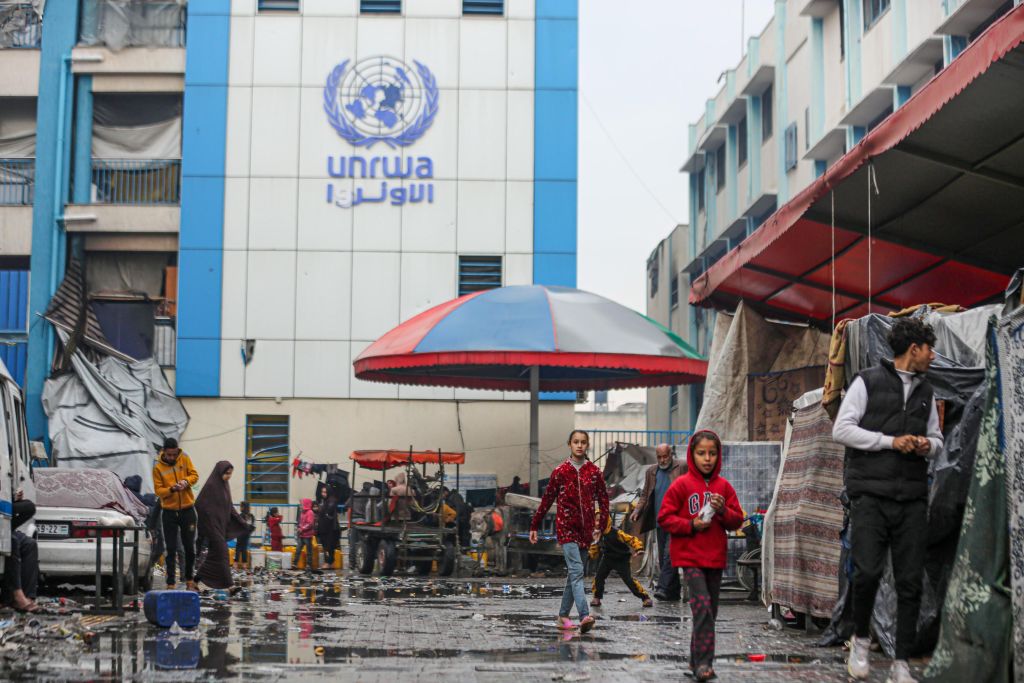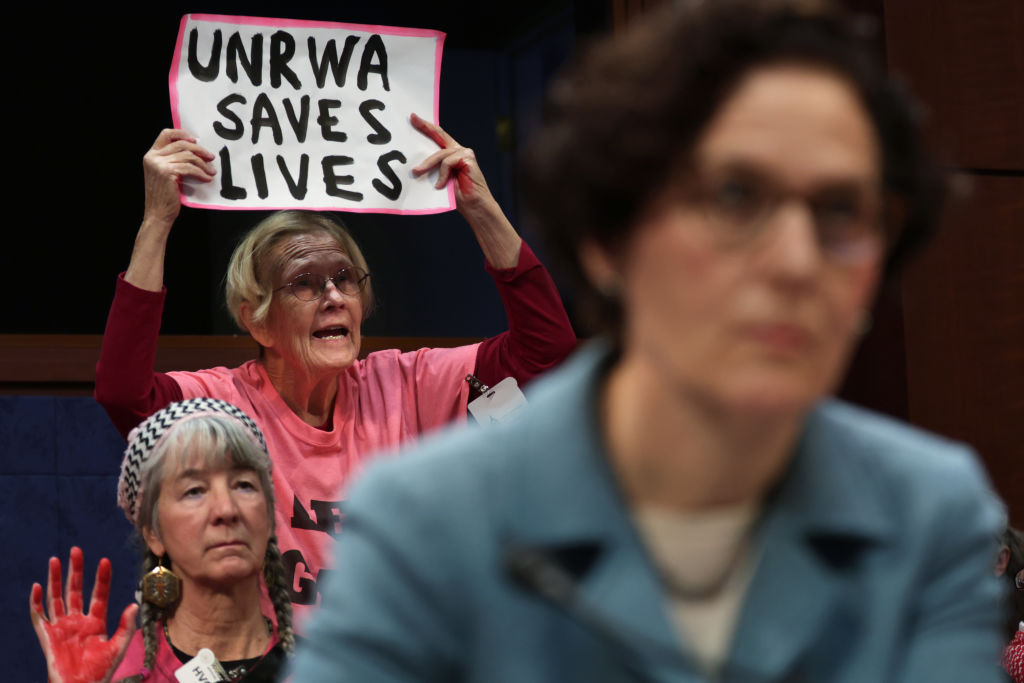
The fate of the U.N. agency dedicated to Palestinian refugees hangs in the balance as U.S. lawmakers prepare to vote on a batch of spending bills that, if passed, would suspend direct funding to the agency for at least a year.
The U.N. agency, known by its shorthand UNRWA, was first established in 1949 to serve Palestinians displaced from their homes and native villages amid the war that led to Israel’s creation the previous year. In the interim decades, the U.N. body has served as a quasi-state for the stateless, providing schooling, healthcare, and other social services for Palestinian refugees in the West Bank (including East Jerusalem), Gaza, and across the region. Since Israel began its bombardment of the Strip in the aftermath of Hamas’s Oct. 7 attack, UNRWA’s role kicked into overdrive, providing not just vital food and medical aid, but emergency shelter for thousands of displaced Palestinians across the Strip.
Providing between $300 million and $400 million annually, Washington was the largest donor to UNRWA—at least until January, when the U.S. and more than a dozen other countries froze their funding amid Israeli allegations that 12 of the agency’s 13,000 employees participated in the Oct. 7 attack. Israel has yet to supply evidence to back its claims, according to the U.N., investigations into which remain ongoing. While several countries—including Canada, Australia, and Sweden—have since resumed funding, the U.S. is the only one that has moved to make its suspension of aid more permanent. The Congressional spending bill stipulates that a ban on U.S. funding for UNRWA will last “until March 25, 2025,” meaning the Biden administration will be unable to reverse the pause until that time.
However, should former President Trump secure victory in November’s presidential election, the decision on whether to reinstate funding would fall to his new administration. The prospects of such an outcome would bode poorly for UNRWA. During Trump’s first term, he cut all U.S. funding to the agency, which his State Department deemed “irredeemably flawed.”

President Biden has already pledged to sign the $1.2 trillion spending bill—which includes billions in funding for several federal agencies, including the Departments for Defense, Homeland Security, and Labor—voting on which must take place today in order to avert a government shutdown. Should it pass, it will leave a huge hole in the agency’s operating budget, which amounts to roughly $800 million a year, according to UNRWA Communications Director Juliette Touma. “Such an outcome will make it harder for UNRWA to assist starving Gazans,” she tells TIME, “and potentially further weaken regional stability.”
It also stands to place further scrutiny on the Biden administration, which has faced mounting criticism at home and abroad over its unfettered support for Israel and its lackluster efforts to deliver vital food aid to Palestinians in Gaza. After all, it was only this week that the IPC, the international community’s authority on hunger crises, warned that famine may already be unfolding in Gaza. “Denying funding for UNRWA is tantamount to denying food to starving people and restricting medical supplies to injured civilians,” Sen. Chris Van Hollen, a leading Democratic lawmaker on the Senate Foreign Relations Committee, said in a statement. “To punish over 2 million innocent people in Gaza and UNRWA beneficiaries throughout the region for these actions is not just misguided—it’s unconscionable.”
In the House, Rep. Rashida Tlaib, the sole Palestinian American in Congress, told her colleagues on Thursday that passing this bill would mean “contributing to the starvation of Palestinian families.”
What remains to be seen is whether the U.S.’s decision to withhold funding until 2025 prompts other countries to restore, or even increase, their own contributions. On Friday, Finland announced that it will resume its annual funding of 5 million euros ($5.4 million) to UNRWA, a portion of which will be earmarked for strengthening the agency’s risk management. In the U.K., the opposition Labour Party (which polls project will form the next government) has called for the British government to follow the E.U. and others in resuming its payments to UNRWA—which amounted to $21.2 million in 2022— alongside increased emergency funding to Gaza.
But it may not be enough. According to Touma, UNRWA’s budget is based on contributions from member states that provide financial support to the Agency over and above their regular U.N. dues. In 2022, the agency received $1.17 billion in funding by governments. The U.S. was the single biggest donor, contributing more than a quarter of that amount.
More From TIME
More Must-Reads from TIME
- L.A. Fires Show Reality of 1.5°C of Warming
- Home Losses From L.A. Fires Hasten ‘An Uninsurable Future’
- The Women Refusing to Participate in Trump’s Economy
- Bad Bunny On Heartbreak and New Album
- How to Dress Warmly for Cold Weather
- We’re Lucky to Have Been Alive in the Age of David Lynch
- The Motivational Trick That Makes You Exercise Harder
- Column: No One Won The War in Gaza
Write to Yasmeen Serhan at yasmeen.serhan@time.com



